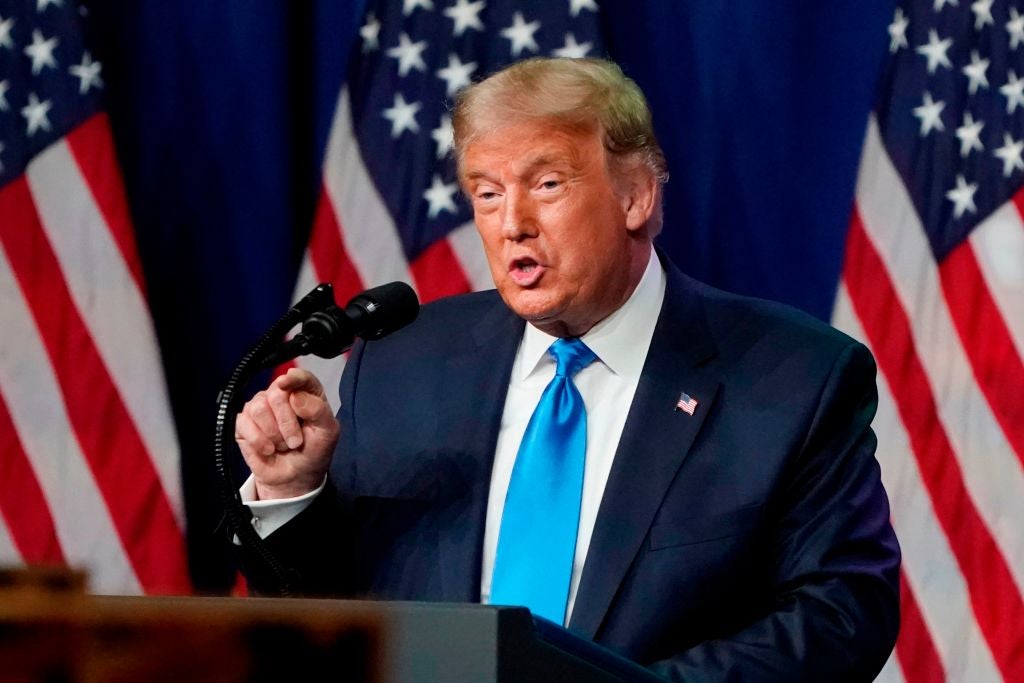Whether the US economy is in ‘phemeomenal shape’ or not, Trump’s re-election chances depend on a quick recovery
How far is the recovery down to the policies of the Trump administration and what does this do in political terms for the president? These are not easy questions to answer, writes Hamish McRae


Will “the economy, stupid” rescue Donald Trump? The famous phrase, coined by Bill Clinton’s strategist James Carville, is regarded as giving direction to his successful presidential campaign in 1992, when the US economy was struggling out of recession.
The US economy is again struggling out of a recession, which in terms of its depth, not of its duration, is far deeper than that of the early 1990s. Donald Trump, however, is the incumbent rather than the challenger, which explains his eagerness to show that the economy is recovering and in “phenomenal” shape.
But is it? How far is the recovery down to the policies of the Trump administration? And what does this do in political terms for the president?
The first bit is easy, the others more difficult. The US economy so far seems to be staging a V-shaped recovery. We have all learnt that conventional economic data is not much help at a time like this, but the so-called high-frequency data seems to confirm that there was a solid recovery in July and that has continued. But the emphasis is on the “so far”, and we know the Federal Reserve chair, Jerome Powell, is concerned that the Fed will have to find a way of doing more to get things pumped up. We should get more of a feeling from the virtual “Jackson Hole” annual central bankers meeting this week.
So yes, there is a recovery but this is mostly down to the tidal wave of money pumped into the economy by the Fed. That tidal wave has driven US shares to an all-time high, and boosted the housing market. But we don’t know the long-term costs, or indeed whether the current asset price boom will be sustained.
So, yes there is a decent recovery, though I would not call it “phenomenal” except in the narrow sense that shares at an all-time high is indeed a phenomenon – an observable truth. But is this down to the administration or the Fed?
Here the answer must surely be that it is mainly the Fed. There has been a fiscal boost, and the crude but direct way the US has done this by sending money straight into the bank accounts of taxpayers under the Coronavirus Aid, Relief, and Economic Security Act seems to have worked. (For non-Americans unfamiliar with the programme, people got a letter signed by Donald Trump telling them how much they would get – for a family of two adults and two children it worked out at $3,400). That did pump up retail sales. Whether there will be another round of payments is not clear. Congress is in recess until after Labor Day (7 September) and nothing can happen until then.
Presumably if another round of payments comes through, perhaps in October, that would help not only the economy but also the margin of the re-election chances of the president. On the other hand, if the payment were not to come through because of a lack of Democrat support in Congress, then maybe that would damage Joe Biden.
Looking ahead it seems most likely that growth will continue at a decent rate through the rest of this year. If the economy starts to falter the Fed will jack in more money to keep it going, but by the end of the year it will still be smaller than it was at the beginning. Most people will be poorer, and sadly too many will be unemployed.
Will they blame the president? A lot of what is happening is beyond his or his administration’s control, so the task will be to avoid unforced errors. It was interesting to see how the markets responded positively to the news that both countries will continue to push forward on phase one of the US-China trade talks. That could have been an unforced error and it wasn’t.
But politicians find it hard to admit that there are things that are beyond their control, and the re-election campaign of Donald Trump is deeply vulnerable to an adverse economic shock. Fairly or unfairly the incumbent gets the blame. Insofar as this election will indeed be about “the economy, stupid”, an unexpected shock could indeed flip it towards Joe Biden. The more often Donald Trump claims the economy is phenomenal, the more vulnerable he becomes to some sudden evidence that it isn’t.
Join our commenting forum
Join thought-provoking conversations, follow other Independent readers and see their replies
Comments